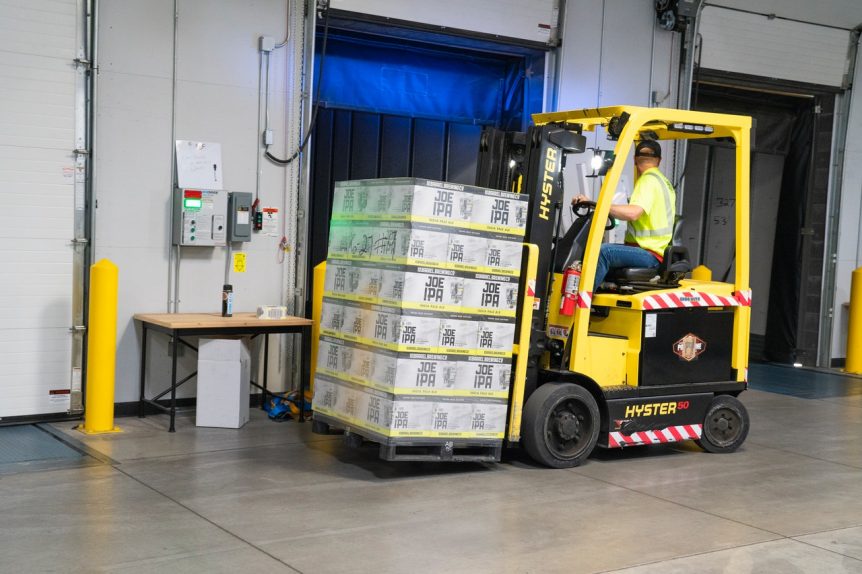A forklift operator works under the supervision of a warehouse manager or supply chain manager. They operate the forklift as well as help manage inventory.
Skills
A forklift operator needs several important skills to do their job with extra efficiency.
They include:
Math Skills. Since the operator is moving inventory around a warehouse and helping with proper stocking of the warehouse, it’s important that they have strong math skills.
Teamwork. Forklift operators aren’t a one-man show. They need to be able to operate in a large warehouse with a lot of moving parts. Strong teamwork skills are essential for working in a coordinated, organized manner.
Communication. Forklift operation is a high-communication job. Operators are constantly receiving information about where to put things and where to pick things up from. Having a strong set of listening skills and good verbal skills are essential.
General Equipment Knowledge. Forklift operators are likely to use other heavy equipment. They will need a good command of heavy equipment in general. It’s likely that they may be asked to help repair the equipment at times, so some basic mechanical knowledge is helpful.
Strength. This is a physical job. Forklift operators will often lift more than 50 pounds repeatedly. They should be able to haul a significant number of palletted goods as they stock warehouses.
Certifications
There are a couple of different types of forklift certifications. Operators may become certified online in the following:
Sit-Down Forklifts. These are used in warehouses, hazardous waste, and construction. They are the most common type of forklift, but they aren’t very compact.
Stand-Up Forklifts. These are more commonly used warehouses as well as farm or retail stores. They are more compact than sit-down forklifts, and they move around more easily.
Aerial or Scissor Forklifts. These lifts can reach up to 40 feet, so special training is required. They are commonly used in construction.
People may receive the certifications at a technical school or a community college. You can also take classes online.
Most operators are hired as an entry-level employee who will receive training that is sponsored by their employer.
The courses typically last two to four hours, but they can be done at an individual pace. After reviewing the course material, participants must pass an exam and purchase their certificate. They will likely need ongoing training on the actual forklift as well.
People can take continuing courses and exams to increase their earning potential, become an instructor, or get ready for promotions.
Training
Forklifts require training to operate safely and effectively. Usually, there is no prerequisite for someone to be hired as a forklift operator. But once hired, they must complete training before they can operate independently.
Training is given by a certified and experienced instructor. They will make sure that trainee operators learn to use the vehicle safely and fill a warehouse or store on schedule.
Education
No special education is needed to become a forklift operator. While a high school diploma is not required at all companies, some employers prefer those with diplomas.
It should be noted that larger companies often require high school diplomas. Candidates should consider getting their GED if they do not have a diploma in order to increase their chances of getting hired at larger shops.
Common Duties of a Forklift Operator
- Preparing items for shipment
- Moving items to and from shipping vessels
- Checking shipments for damaged or missing goods
- Working with a quality assurance manager to report varying quality in goods
- Moving heavy merchandise around a warehouse
- Stocking a warehouse correctly
- Using the radio
- Inventory management
- Helping maintain vehicles mechanically
- Abiding by OSHA standards for the workplace they are in
- Keeping records of their process
Work Environment
Forklift operators will likely work in retail, warehouses, manufacturing, construction, or food service. Their work environment can be chilly or hot at times, and it can get noisy. Ear protection is often required.
They will likely work early morning or late night hours. Hours can include an around-the-clock shift at a 24-hour center.
Becoming a Forklift Operator
There are a few things you can do to increase your chances of being hired as a forklift operator. Potential candidates should work toward a high school diploma. They should also build skills like inventory management in other jobs they may have before training as an operator.
Hands-on training from a certified and experienced instructor is necessary. So is passing the required exams. Beyond that, candidates will need a resume that accurately reflects all of their skills.
